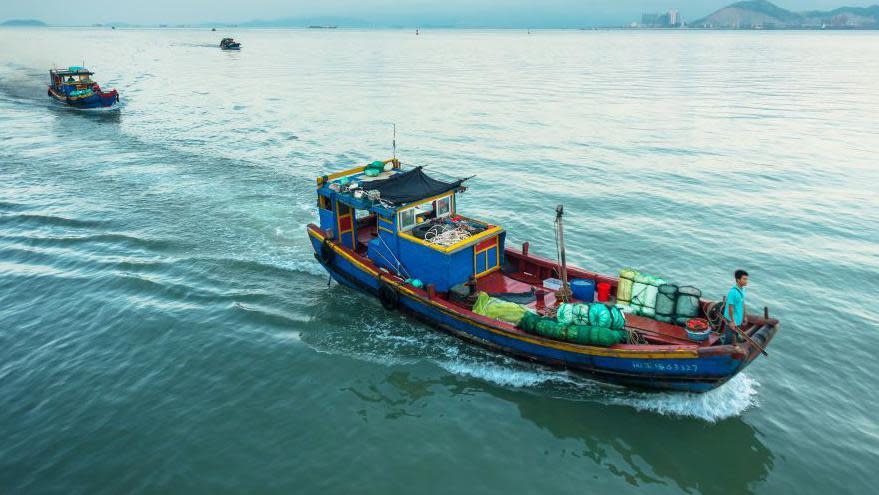China seizes Taiwan boat with crew for illegal fishing

China has said it seized a Taiwanese boat, which had five crew members on board, for illegally fishing in its territorial waters on Tuesday night.
Taiwan has asked China to release the vessel - and the men, two Taiwanese and three Indonesians - which is being held at Weitou, a port in the south-east.
Taiwanese officials have confirmed to the BBC that the boat was seized inside China’s territorial waters, about 2.8 nautical miles (5.1km) off its coast. It was also operating during China's annual summer-time fishing ban from May to August.
"The fishing vessel violated the fishing moratorium regulations and trawled illegally within the... prohibited area," Liu Dejun, spokesperson of the China Coast Guard, said.
He also accused it of using the wrong fishing gear and "damaging marine fishery resources". Taiwan is yet to respond to these comments.
Such altercations have become common in the contested 110-mile strait that separates China and Taiwan.
China claims self-ruled Taiwan as its own and the strait as its exclusive economic zone, although other countries that navigate these waters, such as Japan and the United States, do not recongise this. And the Chinese military has ramped up pressure on Taiwan in recent years.
Chinese authrities have seized and detained 17 Taiwan-registered vessels since 2003 for fishing during the summer-time ban, Taipei's data shows. Taiwan too has detained five such boats from China this year alone.
Taiwanese authorities say they were alerted at 20:04 local time (12:04 GMT) on Tuesday by the captain that officers from two Chinese coast guard vessels had boarded and seized the fishing boat.
There was a brief but tense standoff as three Taiwanese coast guard ships were dispatched to rescue the boat. But they said they did not pursue them because there were four other Chinese coast guard ships approaching and they did not want to escalate tensions.
China's coast guard says the Taiwanese used loudspeakers to demand the release of the fishing boat - and the Chinese did the same, asking the other side not to interfere.
"There were 40 to 50 fishing boats out at sea at the time. I don’t know why he targeted my boat," the owner of the fishing vessel told local media. "This never happened before - in the past they would just chase you away if you got too close.”

Beijing and Taipei used to be more flexible about each other's fishing fleets, especially around Taiwan’s off-shore islands, which lie extremely close to the Chinese coast.
But in recent years Taiwan has been enforcing its own waters more strictly - a response to what it says is a massive increase in poaching by fishermen from China's coastal Fujian province.
In February, two Chinese fishermen drowned after their boat overturned while trying to outrun a Taiwanese coast guard boat. Since then, China’s coast guard has turned more assertive in patrolling around Taiwan’s outlying islands.
China has also become increasingly aggressive in enforcing what it sees as its maritime claims across the region. Its coast guard has become the most visbile arm of Beijing's vast naval operation.
Its dispute with the Philipines over a number of reefs in the South China Sea has caught the most attention and has raised Washington's concerns.
Filipino soldiers fought off Chinese coast guard 'with bare hands'
'Close enough to see their faces': Chased down by China in South China Sea
But the Chinese coast guard has also stepped up its actions around a Japanese-controlled group of islands in the East China Sea, known in Japan as the Senkaku and in China as the Diaoyu.
Last month Chinese coast guard ships took the unprecedented step of driving away Japanese fishing boats close to the islets. It led to a brief stand-off between Chinese and Japanese coast guard ships.
This more assertive Chinese behaviour also comes just weeks after Beijing implemented new maritime regulations that give it’s coast guard personnel wide powers to board, search and detain vessels inside all waters China claims.
Under the new regulations, foreign nationals who are considered to have violated “exit and entry rules” can be detained without charge for up to 60 days.
The new regulations were thought to have been aimed mostly at deterring Filipino fishermen from entering disputed reefs in the South China Sea.
But maritime scholars have been quick to point out that China has expansive, poorly- defined claims across thousands of square kilometers of sea that are disputed by all of its neighbors from South Korea to Indonesia.


